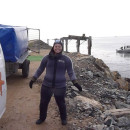New Zealand had so much to discover, of the country and myself Past Review
By Kyleena L (Marine Bioloby, University of Hawaii - Manoa) for
University of Otago, New Zealand: Study Abroad Programme
I just want to do more because I now know what's possible. I want to learn, i want to teach, I want to have fun, I want to work, I want to meet people, I want to spend time with the people I know.
Review Photos


Personal Information
| How much international exposure did you have prior to this program? | 2 weeks - 1 month |
Review Your Program
|
* Overall educational experience
Academic rigor, intensity, resources, etc. |
Grading system is different. An 80% is an A, showing that the grading is more harsh. Also, there is less emphasis on daily homework and much more on essays and final exams. You need to keep up studying on your own or finals will be a fail try at catch-up. |
|
* Host Country Program Administration
On-site administration of your program |
Super helpful, trust in them. |
|
* Housing:
How satisfied were you with your living arrangements? |
Lived in a house with 6 bedrooms, 1 and two 1/2 baths, full kitchen, dishwasher, washer and dryer. Flatmates were almost all American, except the housing program has a kiwi host (a New Zealnader student) flat with us. My kiwi host was awesome and supplied television and dvd player, extra kitchen utensils and dishes, blankets and towels. The flat I stayed in was definitely one of the nicer ones. Furniture all supplied. |
| * Food: |
Love the food in New Zealand. Great Indian food, Asian and Southeast Asian food, as well as lamb and sausage sorts of things. Food has a lot more quality than I'm used to. Farmer's market at the train station is a must. Only bad thing is I could not find any Mexican food so if that's something you live on, be prepared. |
|
* Social & Cultural Integration:
How integrated did you feel with the local culture? |
The University itself had some great cultural days and markets and fairs. You have to pay attention to notices around campus. |
|
* Health Care:
How well were health issues addressed during the program? |
|
| * Safety: |
Dunedin was a very safe place and Otago was constantly patrolled by Campus Watch so I felt very safe. I could walk home near midnight alone and feel safe. The Health center was typical. You have to wait because they only take same-day appointments. But if you need medication, it's cheaper to get a prescription via the health center using your insurance. |
| If you could do it all over again would you choose the same program? |
Yes
|
Finances
|
* Money: How easily were you able to live on a student's budget?
(1 = not very easy/$200+ on food & personal expenses/week, 2.5 = $100/week, 5 = very easily/minimal cost) |
|
Direct Enrollment/Exchange
| * Did you study abroad through an exchange program or did you directly enroll in the foreign university? | Exchange |
Other Program Information
|
* Where did you live?
Select all that apply |
|
|
* Who did you live with?
Select all that apply |
|
A Look Back
| * What do you know now that you wish you knew before going on this program? | IF you like the outdoors, smaller cities and towns, mountains, beaches, lakes, and such, NEw Zealand is the place to go. |
Individual Course Reviews
| Course Name/Rating: |
Marine Botany |
| Course Department: | BTNY 225 |
| Instructor: | Catriona Hurd |
| Instruction Language: | English |
| Comments: | A general overview of algae. Really cool getting to see the different algae of New Zealand. It's a small class so the lecturers get involved. There's a field trip to a beach that's sweeet. The lab is sort of tougher than average intro class. |
| Credit Transfer Issues: | Yes, it transfered as a 3 credit class as a BTNY 180 class, survey of Marine botany. |
| Course Name/Rating: |
Maori Culture |
| Course Department: | MAOR 102 |
| Instructor: | Suzzane Boyes |
| Instruction Language: | English |
| Comments: | Highly recommend this course if you are interested in getting some culture and history background of the indigenous peoples of New Zealand, the Maori. Boyes was a great lecturer and it isn't a hard class but not a guaranteed A class. You have like 2 essays to write (short and long), 2 online tests, and one final exam. |
| Credit Transfer Issues: | Got 3 credits for it. Was a Non introductory Anthropology class. Fufilled humanities gen. ed requirement. |
| Course Name/Rating: |
Marine Invertebrates |
| Course Department: | MARI 202 |
| Instructor: | Miles Lamare |
| Instruction Language: | English |
| Comments: | There is a lot to cover because it goes over 9 phlya of marine invertebrates, including examples of the various differences of movement, structure, circulatory system, digestive system, evolutionary traits, etc. This makes the lecture a little dry and the labs often long and general. There is a field trip on the University's research vessel out into the harbor. |
| Credit Transfer Issues: | still under review |








